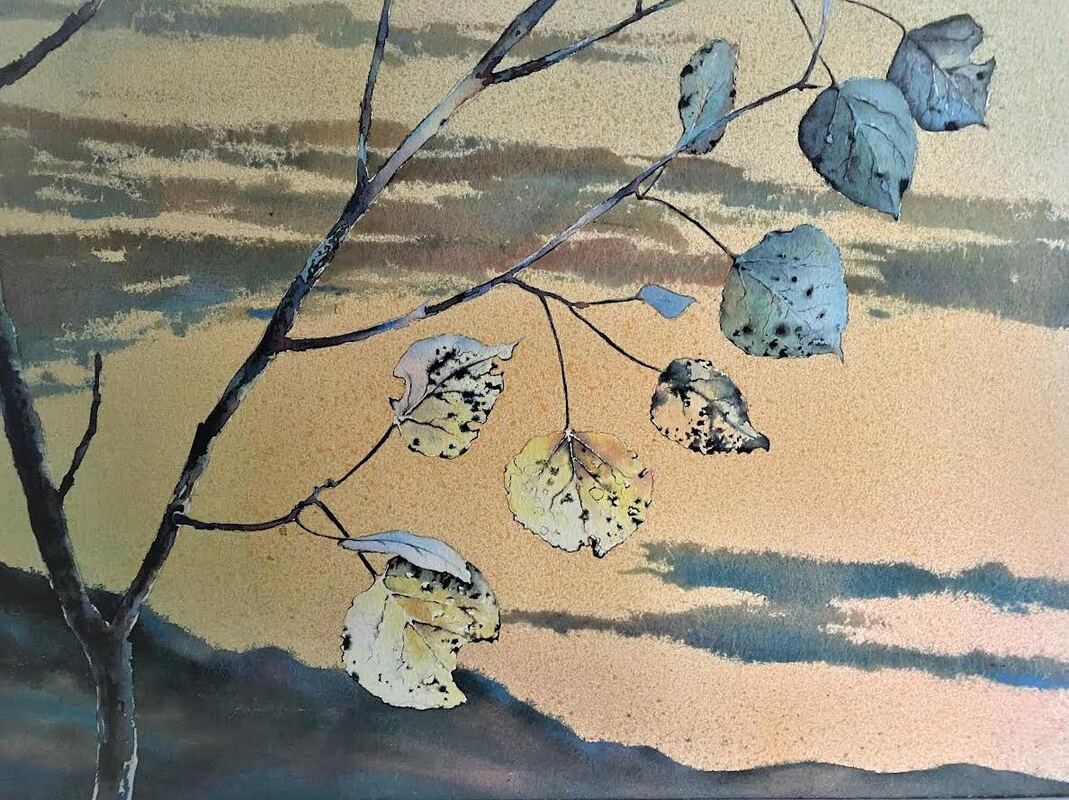|
Aspen Leaves Justin Locke’s watercolour, Aspen Leaves, is haunting even for those not acquainted with the high country. The scene is depressingly austere: dying leaves cling to dying branches on a dying day. And yet there is beauty here: the fading yellow of the sky, a gauze of gray clouds fingering across, a message of satisfaction that the day was acceptably free of disappointment. But the leaves are yellowed, pitted from insect diets, scabbed with uninvited mildews. They have long lost their summer tint, the deciduous lizard green among darker forest conifers. They are spent—as is the day itself. There is no promise here. Only the resolution to clone new offspring to poke through snowmelt when spring permits. Only the perseverance to prevail on an uncontested patch of high meadow. However, there are nested layers of reality behind the pigments and the brush strokes, and these entangle my mind. There’s first the art itself: the pastel play of colour, the subtle texture of the clouds, the gaunt asymmetry of the branches. The scene itself has a brittle sadness, a nocturne playing across it. My gut response is best described (if at all) through colors and sounds and tastes, not by words. This is a reality partly independent of the leaf, the tree, the landscape, but evoked thereby. It is this play on my senses alone that initially seizes my attention and causes me to procrastinate. Then there’s the layer behind the art, the reality that the artist witnessed and transformed for me to see. It lies in the memories of those of us who trek the wilderness: a broader reality that encompasses the entire tree and beyond. It embraces the collective assembly defining the single organism of the aspen stand. It incorporates, as well, the others peppering the distant mountainsides with yellow patches of autumn. This is the reality of accessible memory, which embellishes the aspen with those humanizing verbs—to resolve, to persevere—assigning agency. The deeper layer is the reality I encounter when standing there in the remote chill at high elevation, the aroma of spruce and fir enshrouding me, the wind whispering across treetops, all of my senses captive. Unembroidered, there are no judgments here, no moral residues. There is no resolution to clone; no perseverance to prevail. The tree does not struggle. It simply is. The sundry living forms, seen and not, are neither sublime nor purgatorial. They are simply pervasive and cyclical. A tiny fragment of this cycle is what the artist has captured. It is what calls up the conflicting layers of my world and invites me to linger. Ron Wetherington Ron Wetherington is a retired anthropologist living in Dallas, Texas. He has a published novel, flash non-fiction in The Dillydoun Review, and upcoming fiction in Words & Whispers and Flash Fiction Magazine.
0 Comments
Your comment will be posted after it is approved.
Leave a Reply. |
The Ekphrastic Review
COOKIES/PRIVACY
This site uses cookies to deliver your best navigation experience this time and next. Continuing here means you consent to cookies. Thank you. Join us on Facebook:
July 2024
|




